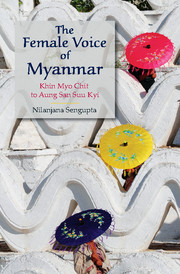Book contents
- Frontmatter
- Dedication
- Contents
- List of Figures
- Glossary
- Preface
- Acknowledgements
- Introduction
- Chapter 1 Khin Myo Chit: The Voice of a Closet Feminist
- Chapter 2 Ludu Daw Amar: The Voice of Unity
- Chapter 3 Ma Thida: The Voice of Hidden Truths and Changing Times
- Chapter 4 Aung San Suu Kyi: The Voice of a Pragmatic
- Annexure I Chronology of Khin Myo Chit's Publications
- Annexure II Chronology of Ludu Daw Amar's Publications
- Annexure III Chronology of Ma Thida's Publications
- Bibliography
- Copyright and Sources of Photographs
- Index
Chapter 2 - Ludu Daw Amar: The Voice of Unity
Published online by Cambridge University Press: 05 January 2016
- Frontmatter
- Dedication
- Contents
- List of Figures
- Glossary
- Preface
- Acknowledgements
- Introduction
- Chapter 1 Khin Myo Chit: The Voice of a Closet Feminist
- Chapter 2 Ludu Daw Amar: The Voice of Unity
- Chapter 3 Ma Thida: The Voice of Hidden Truths and Changing Times
- Chapter 4 Aung San Suu Kyi: The Voice of a Pragmatic
- Annexure I Chronology of Khin Myo Chit's Publications
- Annexure II Chronology of Ludu Daw Amar's Publications
- Annexure III Chronology of Ma Thida's Publications
- Bibliography
- Copyright and Sources of Photographs
- Index
Summary
“What we came across in these bloodthirsty times
…We often stopped to look at the names of God
We lifted them with tenderness because they reminded us
Of our ancestors, of the first people, those who said the prayers”
Gautama Christ, Pablo Neruda“What narrow paths, deep woods and slippery moss!
Whither are we bound today?
To the mountain, the foot of the mountain,
Red flags stream in the wind in a blaze of glory.”
New Year's Day, Mao Tse TungRevolution! Revolution! Revolution!
18 September 1988, Mandalay
Ludu Daw Amar reached for her inkwell and pen. Outside her window, dawn was breaking – the first streaks of orange in the east and a waning moon in a still dark sky.
The night had ended but the day was yet to begin.
It was the mercilessly hot month of Tawthalin when fretful inhabitants of Mandalay call the sun a prawn-killer and pray for the weather to break. A monk stood at the corner of 33rd Street, his head bent, holding an alms bowl in the crook of his arm, strangely detached from reality. Daw Amar wondered if later he would be joining the monastic boycott against military donors.
Her mind was not at rest, she could not sleep. Ever since last month when with the torrential showers of August a new revolution had broken in Burma her blood had been singing. At 73 she felt alive once again, as if she was still a student at the Rangoon University, eagerly awaiting life. She felt a sense of urgency, she needed to write another editorial and hand it over for publication. Initially they had to do it stealthily, often distributing handwritten sheets. Of late Nyi Pu Lay had been bolder. Nyi Pu Lay, she thought with a sigh…the only one of her three sons…
But there was no trusting Saw Maung and his army. She had to caution the boys, Min Ko Naing and Htay Kywe and the many others leading the movement. At this point they needed to remain united and calm for the military awaited another spark. She thought of Thakin Aung San's daughter with her father's forehead and eyes.
Daw Amar picked up a paper with a vivid blue peacock printed at the top – a bird taut with bottled up rage – and wrote, “Revolution! Revolution! Revolution!”
- Type
- Chapter
- Information
- The Female Voice of MyanmarKhin Myo Chit to Aung San Suu Kyi, pp. 83 - 154Publisher: Cambridge University PressPrint publication year: 2015



